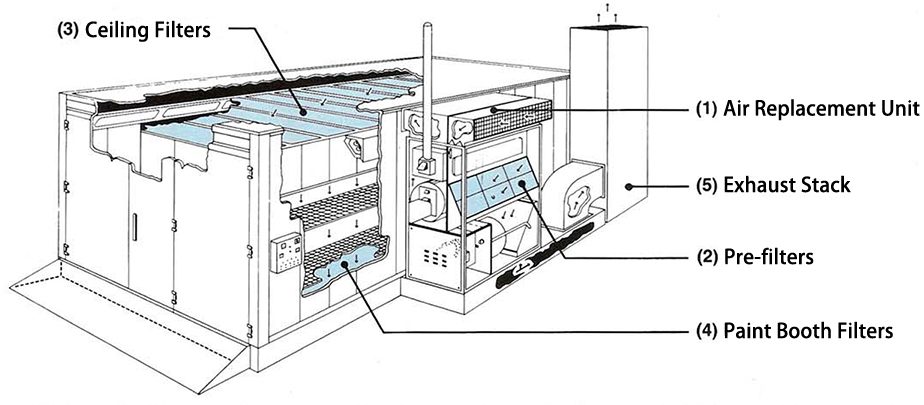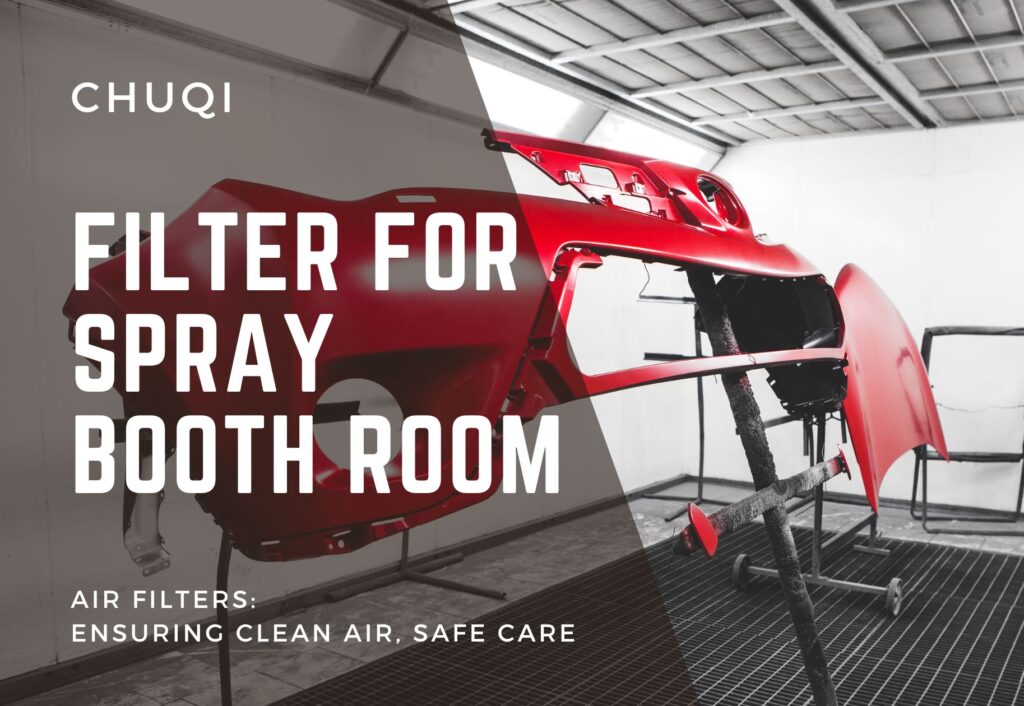Working in a spray booth means keeping the air clean and ensuring a flawless paint job, and the right filter plays a crucial role in that. So, how do you make the best choice? No worries—I’m here to guide you. Let’s explore the various types of spray booth filters and what factors you should consider to make a well-informed decision that enhances your painting results.
Types of Spray Booth Filters
Primary Filters – Pre Filters
Pre filters are the workhorses of air purification, commonly used in the pre-filtration stage of air systems. Their main job? To catch those big dust particles and filter out things like 25μm dust and other airborne nasties before they clog up your ceiling filters.
These filters are made from synthetic fibers with a gradually increasing density, which gives them some great perks: they’re cost-effective, have low initial resistance, high dust-holding capacity, and they’re flexible, safe, and eco-friendly. Keep in mind—the size and type of these filters are influenced by your spray booth’s design. And if you replace these regularly, you’ll extend the life of your ceiling filters.
Medium Efficiency Filters – Ceiling Filters
Ceiling filters, also known as ceiling mats, fall under the medium efficiency category. They usually take on the second stage of filtration after the primary filters and are often used as filter media in panel filters.
These filters are designed specifically for the final stage of filtration in spray booths, filtering out particles larger than 1μm. They offer high airflow with low resistance, high dust-holding capacity, and are both economical and practical. They’re made from synthetic fibers with increasing density and reinforced with a net on the exhaust side to ensure even airflow. They come in different grades like F5, F6, F7, F8, and F9, with F5 being the most commonly used.
Floor Filters – Paint Booth Filters
Floor filters, also known as paint mist catchers or fiberglass filters, are all about handling that extra paint. They’re perfect for capturing paint mist, keeping your equipment clean, and protecting the environment. These filters commonly find their place on spray booth floors, in the exhaust systems of dry paint booths, automotive spray booths, and even beyond.
Made from long glass fibers in a non-woven form, these filters have high airflow, low resistance, and excellent paint mist capturing efficiency. Plus, they’re durable—they maintain their shape well and are great at storing paint mist dust. The filters come in green and white so you can easily tell which side is the intake and which is the exhaust. They’re also flame-resistant and can handle temperatures up to 170°C.
Key Factors for Choosing Spray Booth Filters

- Filtration Efficiency
| Type of Filters | Filtration Efficiency Standards | Impact on Paint Quality |
| Primary Filters-Pre Filters | These can filter out dust and particles larger than 25μm | Which helps keep large impurities out of the air, providing a basic level of air cleanliness and ensuring a decent paint finish. |
| Medium Efficiency Filters-Ceiling Filters | These tackle particles larger than 1μm | Improving air purity further and reducing the impact of tiny particles on your paint job, leading to a smoother, more even finish. |
| Floor Filters-Paint Booth Filter | These are pros at capturing paint mist | Preventing it from spreading and keeping your spray booth clean, which is crucial for a high-quality paint job. |
- Air Permeability
Air permeability plays a huge role in spray painting. Good permeability ensures smooth airflow, helping solvents evaporate quickly, so your paint dries faster. This reduces issues like sagging or bubbling and boosts the quality and efficiency of your paint job.
For instance, if you pick a filter with poor permeability, it could slow down airflow in the booth, making solvents evaporate more slowly. This could lead to longer drying times, a slower work pace, and even problems like sagging or uneven colors—definitely not what you want.
- Durability
Durability is all about material strength, resistance to wear and tear, corrosion, and how easy it is to clean.
To gauge a filter’s durability, look at a few things: first, the material quality—strong, wear-resistant materials usually last longer. Then, check its resistance to corrosion, especially if it’ll be exposed to chemicals during the painting process. Lastly, consider how easy it is to clean. Filters that are easy to clean and maintain their performance after cleaning can be reused multiple times, extending their lifespan.
Wrapping It Up
Choosing the right spray booth filter isn’t a walk in the park—it takes some careful thought. First off, know exactly what your spray booth needs and the environment it’ll be used in. If air quality is super important for your work, go for high-efficiency activated carbon filters. If budget is a concern, medium-efficiency filters might be your best bet.
Next, air permeability is crucial for your paint job’s quality and your workflow’s efficiency. Make sure your filters allow smooth airflow to avoid common paint problems.
Lastly, durability ties directly to long-term costs. High-quality materials and easy-to-clean filters can last longer, making them more cost-effective in the long run.
Still not sure which filter to choose? No worries—leave it to us. We can provide all the filters your spray booth needs. We’re a professional filter manufacturer with 20 years of experience, so we know a thing or two about quality and customization. If you need samples, just get in touch. And hey, feel free to visit our factory in China—we’d love to show you around.

